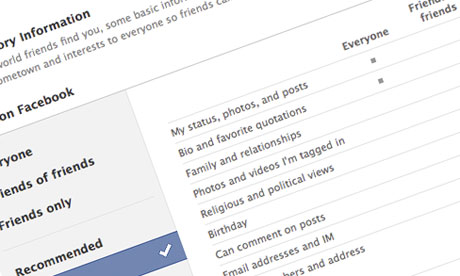
Privacy groups gave a half-hearted welcome to Facebook's announcement on Wednesday night that it would roll out new, simplified privacy settings to its 450 million users in the next few weeks.
The UK group Privacy International reacted with "disappointment and frustration", saying that "the latest changes merely correct some of the most unacceptable privacy settings on the site. Very little has changed in terms of the overall privacy challenge that Facebook and its users need to navigate."
Instead it said that the changing of the settings – which previously required users to navigate through up to 150 different settings to control who could see their data, to a simpler four-tiered version plus a "customise" option – was "merely a red herring".
The problem, it said, is that "Facebook operates on a business model that requires it to monetise the data harvested from customers."
But Mark Zuckerberg, the Facebook founder, was insistent yesterday that the company does not sell any personal data to advertisers or marketers, and that people misunderstood how its targeted advertising system worked.
Facebook's adverts will still target individuals even if they share absolutely no data with anyone, he explained: "The principle is that we don't give any information to advertisers. None. They come to us and say that they want to hit a certain group of people, and we target the ads ourselves. We take the ads, and show them to the person that we think is interested. So it doesn't matter who you're showing your information to. It doesn't matter if you share it at all. It makes no difference to the advertising or the advertisers."
The reason why Facebook recommends that people share some of their information, such as "status updates" about their mood, or details about where they live, he said, is so that other people on the service can find former friends or people they want to befriend. "It does by definition make sense to share [those] with everyone," Zuckerberg said as he launched the new settings at Facebook's headquarters in Silicon Valley. "But for photos and videos, it makes sense to restrict them."
He insisted that the changes made in December, which spread status updates and other personal identification around the internet by default, were not done to please advertisers. "Anyone who knows me knows that that's crazy."
The American Civil Liberties Union, which had collected more than 80,000 signatures on petitions demanding that Facebook should give users control over all the information, and not share it with third parties without opt-in consent, said that the company deserved "a lot of credit" for the changes it had introduced. "These changes address several of the most serious privacy problems with [Facebook's] service."
But it said that Facebook needed to roll back the sharing of basic information to the situation of a year ago, where most information was private by default.
Meanwhile, Facebook users have suggested their own way to make Zuckerberg more sensitive to how his site's privacy settings work – with the creation of a new Facebook group. Its title: "Whatever the default privacy settings are Mark Zuckerberg should be on them". Its self-description: "If he expects us to have them by default then Mark Zuckerberg should be using them! If he's not prepared to use what he calls the defaults then why should we tolerate them."
Although it only began early on Thursday, created by London-based web designer Jeff Sutton, the group is growing rapidly. It is not presently known whether Zuckerberg uses Facebook's "recommended" settings – though the Guardian is trying to establish this.
Update:: Facebook has replied, and says that Zuckerberg has privacy settings that are slightly more open than the recommended settings.
In a statement, a spokesperson said: "Mark shares most information about himself and what he's up to with anyone who visits his profile. Some of these settings are more open than the recommended settings. At the same time, he's somewhat of a public figure and so he limits friend requests and messages on his personal page and, instead, uses his public page to interact with everyone (http://www.facebook.com/markzuckerberg). You can see what he shares on his personal page by having a look at his profile: http://www.facebook.com/zuck."
So now you know...

